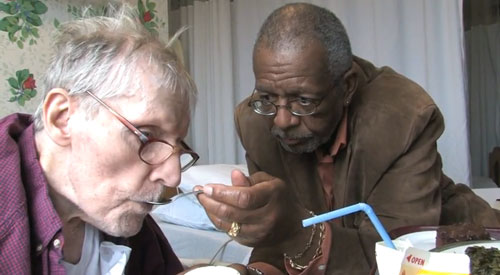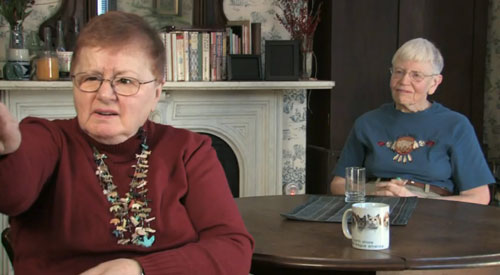
“If we are saying, ‘Come out and be filled with pride, then it’s our responsibility to make sure that continues right through their last day.'”
Last night, I saw a screening of “Gen Silent” at The Coolidge Corner Theatre in Brookline. The documentary, made by Missouri School of Journalism alumnus Stu Maddux, focuses on the challenges facing LGBT adults as they age. He followed six Boston-area adults as they navigated the care system and asked themselves, “Who’s going to take care of me when I can no longer take care of myself?”
For many of their straight counterparts, the answer has been easy: their children will care for them. It’s trickier for LGBT adults. Some of them don’t have kids and grandchildren to care for them. For others, their LGBT identity has alienated them from their families. The prospect of nursing homes can scare anyone, especially people from a generation when homosexuality was considered a mental illness worthy of shock therapy. I don’t enjoy going to doctors, but I can only imagine what it would be like if I had the experiences with doctors that these people had.
This documentary opened my eyes to many issues I had not yet considered. Some of the people interviewed mentioned cases where caregivers came into gay adults’ homes and tried to convert them. For many LGBT people, going back into the closet seemed like the best way to survive being in a nursing home.
This would be heart-breaking for anyone to hear, but especially when you consider what these people have done for us. After the screening, “Gen Silent” director Stu Maddux stood up and addressed the crowd, mainly filled with LGBT adults who were peers to the people featured in the film. “As a gay man who has stood on your shoulders, you are in my eyes ‘the greatest generation.’ I made this film as a tribute to you.”

“We have a whole generation of people who don’t know who we are. That’s really sad, because you’re missing out on a lot. We know a lot. We did a lot for you. You wouldn’t be here if it wasn’t for us.”
I had never used the term “the greatest generation” when referring to that generation of LGBT individuals, but Stu was right. These are the people who put their lives at risk and marched when there were few others with whom to march. These are the people who came out when it was still acceptable to send gay people to mental institutions. These are people who had to refer to their partners and lovers by code names of the opposite sex so as to not be found out. These are people who knew too many people who committed suicide because they’d rather be dead than go through what gays had to go through back then.
In the last six months, there have been a spate of “It Gets Better” videos. Well, it was because of these people that it ever got better in the first place. What the documentary painstakingly (and painfully) shows is that these people now need our help. If we don’t help them, who will? One of the caregivers featured in the film recalls how back in the 1980s, many gays banded together to help gays with AIDS. There were buddy networks and other programs designed to provide care for people who otherwise had no one to care for them. What this woman suggested in the film and again when talking with her after the film is that we now need that banding together again. We need people to reach out and ask what they can do to help these people who put their lives at risk for us.
Of course, as my friend Kye pointed out when we left the theatre, these people are not the only ones who need our help. Anyone who is navigating the care system — gay, straight, black, white, Cylon — could benefit from someone volunteering his or her time.
For more info on the LGBT Aging Project, go here.

Thanks, PMG, for posting this call to action. Here’s a related story from California Watch:
Isolation, chronic disease more common among older gays, lesbians
Aging lesbian, gay and bisexual adults in California have higher rates of chronic disease, mental distress and isolation than their heterosexual counterparts, according to a report released yesterday by the UCLA Center for Health Policy Research.
(March 30, 2011)
http://californiawatch.org/dailyreport/isolation-chronic-disease-more-common-among-older-gays-lesbians-9524